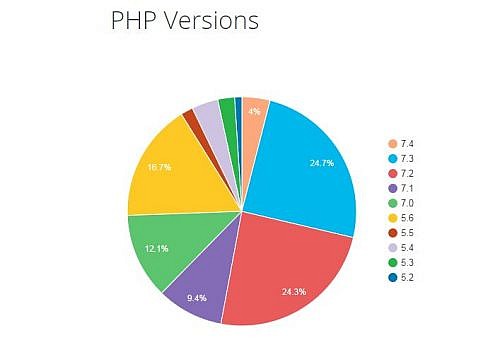Late last week WordPress made major progress towards the goal of getting users to adopt newer versions of PHP. The ServeHappy API has been updated to set the minimum acceptable PHP version to 7.2, while the WordPress downloads page recommends 7.3 or newer.
Sergey Biryukov committed this change on the meta trac after Marius Jensen opened a ticket for it nine days ago. Previously, the ServeHappy dashboard widget was showing the upgrade notice to users of PHP 5.6 or lower.
“After discussing with the core Site Health team and the Hosting Team, it has come up that the most sensible next move is to show the upgrade notice to users of PHP <=7.1 (this means setting ACCEPTABLE_PHP to 7.2),” Jensen said.
“Looking at the numbers, we’re seeing roughly 25% of sites running a WordPress version that includes ServeHappy [that] would then get an upgrade notice.”
This change means that the majority of WordPress sites are using an acceptable version of PHP. Approximately 47% are running WordPress on older versions. Those who are on WordPress 5.2+ (when Site Health was introduced) will see the upgrade notices generated by the ServeHappy API.

This update also bumps the lowest branch of PHP which is actively supported to 7.3 and bumps the lowest branch of PHP that is receiving security updates to 7.2.
The Site Health team scheduled the change for last Friday, but Jensen noted that the API call is cached for a week in core. It should start popping up for users throughout this week.
In December 2018, PHP 5.6 and 7.0 reached End of Life (EOL) and stopped receiving security updates. This left approximately 83% of users on unsupported versions of PHP at the end of 2018. Today, with the progress encouraged by the Site Health project, 47% are on unsupported PHP versions. The update put in place last week should help significantly decrease this number before PHP 7.2 reaches EOL in November 2020.
Jenny Wong, who helped coordinate the project as part of the Site Health team, described how they got started and worked successfully across teams with design, Polyglots, and Hosting contributors to make this update possible.
“I remember going to WordCamp San Francisco and sitting down with Andrew Nacin and Mark Jaquith at lunch and asking them why WordPress supported such old versions and what the project was doing about it,” Wong said. “They told me the work that had been going on.
“They told me the issues, they took the time took explain it all to me and answer all my questions.”
Wong said she was grateful to be part of that initial discussion in 2014 and to have shared in the journey with dozens of contributors.
“To the polyglots who translated everything we threw at them, to everyone else who gave feedback, argued, fought, discussed and debated, to everyone who has shared ideas and patches, to every person who has listened to me complain, took my wild ideas and made them an reality – Thank you!” Wong said.
Given WordPress’ large share of the market, encouraging adoption of newer versions of PHP will help make the web more secure. Please note that this update means that 7.2 is now the lowest branch of PHP that is considered acceptable for use with WordPress, according to the ServeHappy API. Sites that are running on older versions may continue to work but WordPress will continue strongly urging users to upgrade.

